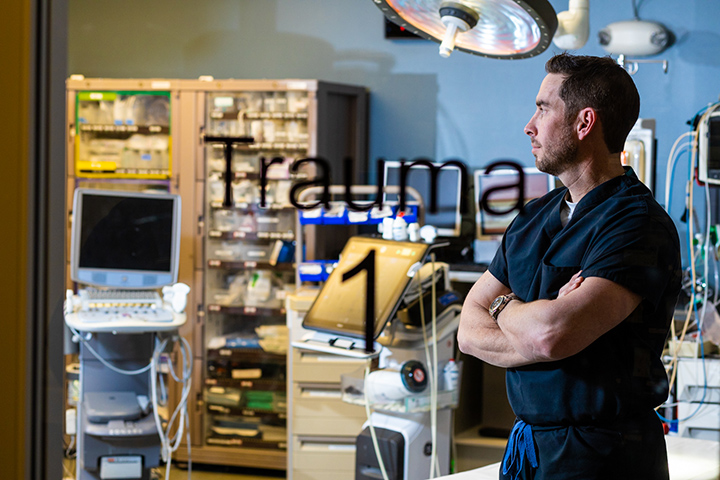Why did you decide on pharmacy as your career?
In 2000, I was able to get a job at Saint Luke’s Hospital in Kansas City as a Pharmacy Technician. I had never really considered pharmacy as a career option, largely because I was unaware of the vast roles a pharmacist could fulfill. Once I saw the impact that pharmacists could have in a clinical setting, however, I was sold.
What were you plans as a pharmacist when you started school?
I immediately knew that I wanted to do something faster paced that could satisfy my needs as an adrenaline junkie. At Saint Luke’s, I would walk through the emergency department when the trauma/resuscitation team was engaged in a critical case. Without fail, I felt an overwhelming sense of desire to become involved with what they were doing. It was a type of controlled and even choreographed chaos as 15 providers would work almost in unison to help save a patient’s life. From the first time I saw this, I knew that I wanted to practice emergency medicine when I graduated.

Describe your role as an emergency room pharmacist?
My greatest responsibility lies in rapidly providing high-level clinical care by initiating critical treatments as expeditiously as possible. Each time a critically ill patient presents, I try to formulate a differential diagnosis of the top four or five things that could be happening (as well as any complications that could arise) while simultaneously developing a treatment plan for each possible contingency. By the time an initial diagnosis is made by the physician, I try to have the treatment prepared and ready to be initiated. I don’t think it’s hyperbolic to say that the time saved between diagnosis and treatment can ultimately mean the difference between life and death.
How do you see the roles of pharmacists continuing to evolve in the future?
With the physician shortage, we’ve seen a progressive expansion of non-physician utilization for care, including nurse practitioners, physician assistants, and pharmacists. I expect this expansion of roles will continue for the foreseeable future, and will hopefully extend to prescribing rights being granted to pharmacists. The opportunities available to pharmacists are continuing to expand. There are now pharmacists working within the FAA and even with NASA, and I would love to see opportunities open up for adrenaline junkies like myself to get involved with Life Flight services.
What do you most enjoy about your particular job as a pharmacist?
I love Emergency Medicine! It’s an environment that can be chaotic one day and completely calm the next, which means you have to be flexible and not overly rigid. I also love the fact that the team trusts me and allows me to practice at the top of my ability. I am regularly sought out by the physicians to provide hands-on care in life-or-death scenarios. I am also entrusted with the responsibility of developing and implementing treatment plans that will not only stabilize the patient but also maximize survival.
What does your typical day look like as a pharmacist?
No day is typical and no two days are the same. That’s one of the biggest reasons I love what I do so much. I never know if it’s going to be a day where we’ll save the lives of a dozen people exposed to toxic chemicals in a warehouse explosion, stabilize a critically injured patient thrown 50 feet off of a motorcycle, resuscitate a patient whose heart has been stopped for 30 minutes, or if it will be a day where everyone is “healthy” and no one comes to see us.
What do you do outside of work for fun?
My beautiful wife and I have two children and both are very involved in sports. I play baseball in an over-35 men’s league in Kansas City. A a huge aviation fanatic, I am embedded within the aviation photography world, having had the opportunity to serve as an official photographer for dozens of air shows. Somehow, I won an international aviation photography contest sponsored by Breitling and judged by John Travolta. Breitling paid for my flight training that resulted in being able to earn my pilot license, or Private Pilot Certificate to be more accurate.
What advice do you have for someone thinking about a career in pharmacy?
I highly recommend seeking opportunities to shadow a practicing pharmacist. There’s no better way to get a feel for something than to check it out in person. Most important, I would reach out to the UMKC School of Pharmacy’s Office of Student Services. They are an amazing group of individuals who are 100% dedicated not only to our current students but to our prospective students as well. My decision was solidified after I spoke with several UMKC School of Pharmacy students and found they had nothing but glowing things to say. If someone wants to become a very high-level health care practitioner, the UMKC School of Pharmacy is the obvious choice. The education I received has served as a very robust cornerstone for my professional career.
